The Hart Museum remains closed. Los Angeles County has approved a plan to transfer the William S. Hart Museum and Park from the County to the City of Santa Clarita.
Getting to Know: Enjie (Jane) Li
Enjoy getting to know Jane, a Postdoctoral Fellow who holds a joint appointment between NHM and The Nature Conservancy.
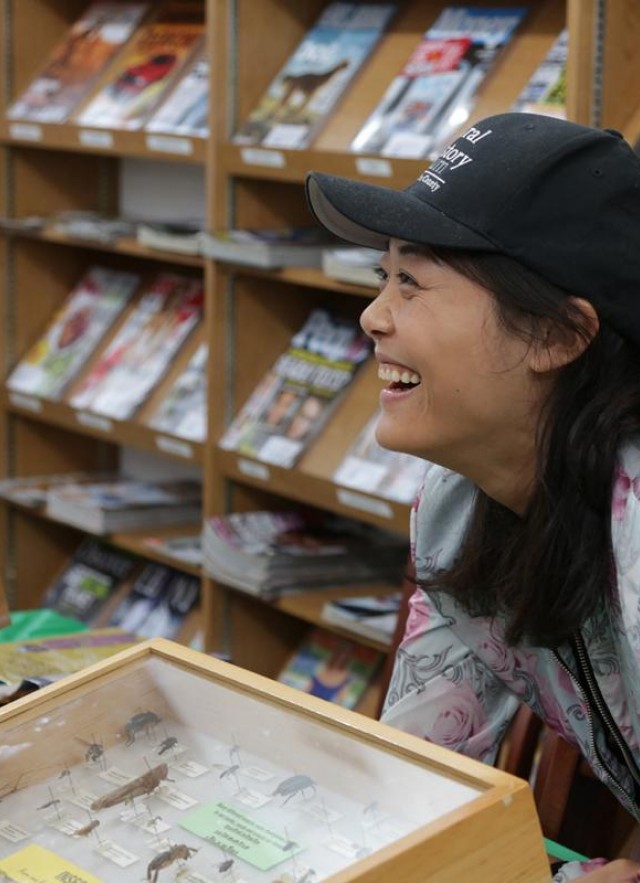
More than 450 people work at the Natural History Museums of Los Angeles County. Through my community science work with the Urban Nature Research Center, I met Enjie (Jane) Li. Jane is a Postdoctoral Fellow who holds a joint appointment between NHM and The Nature Conservancy. Since Jane is funny, smart, and nice, I thought it would be fun to interview her. Please enjoy getting to know Jane Li.
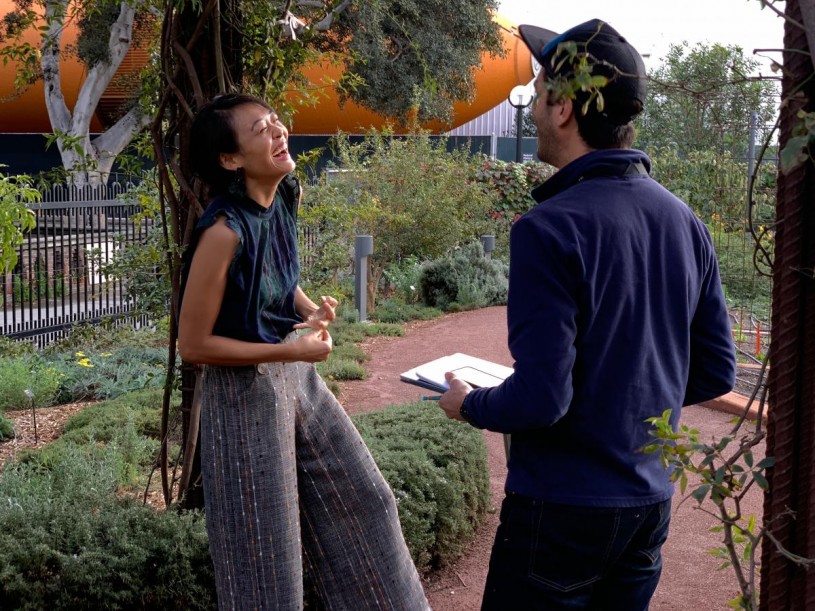
Your workspace is in the Herpetology Department at the museum, which I find odd since it is well-known among your coworkers that you are afraid of snakes. How did you get assigned to that office?
Haha, the Herp Lab is a good working place—it is down in the basement, very quiet with few distractions. My bosses thought this would be the best place for me to work and meet great people, and they were right! During my job interview, I did not tell the hiring committee about my fear of snakes, well, I also did not realize my snake phobia was really bad until they assigned me to work in the Herp Lab. People down here are very supportive in helping me overcome my fear. My officemate, Bree Putman, hid her cute stuffed snake toys and took down her snake posters to help me gradually transition in this “snake friendly” environment. My snake phobia has definitely gotten better, although it is still a work in progress!
Where did you go to college, and what did you study? Why did you choose to study there, and why did you choose your major?
I did my undergraduate at China Agriculture University with a major in grassland science. Honestly, I did not put too much thought into selecting my school or deciding my major. Back in China, the college entrance exam is very competitive, and the priority of most students is to get high scores rather than figuring out their personal interests and career goals. The general approach to selecting a school there is to go to the highest-ranked school possible. My dad, just like millions of Chinese parents, helped me choose a college and a major. The only decision I made during this process is to go to Beijing for college. So, there you go, my dad chose the best agricultural school in China for me. Why agriculture? My dad loves farming, gardening, and nature, and he thought at the time that agriculture would be the foundation of China’s economy for another 20 years. Well, I guess he really underestimated the progress and development of the technology industry in China. Hahaha.
But it all worked out. I am glad I went to Beijing for college, it exposed me to all sorts of information and cool stuff. During that time, I met some of my best friends and hung out with a group of international students while being introduced to a whole lot of new cultures, particularly American pop culture, such as, skateboarding, hip-hop, rock, punk, and indie movies. It was awesome. I think that’s the turning point where I decided to come to America, to experience what America is all about.
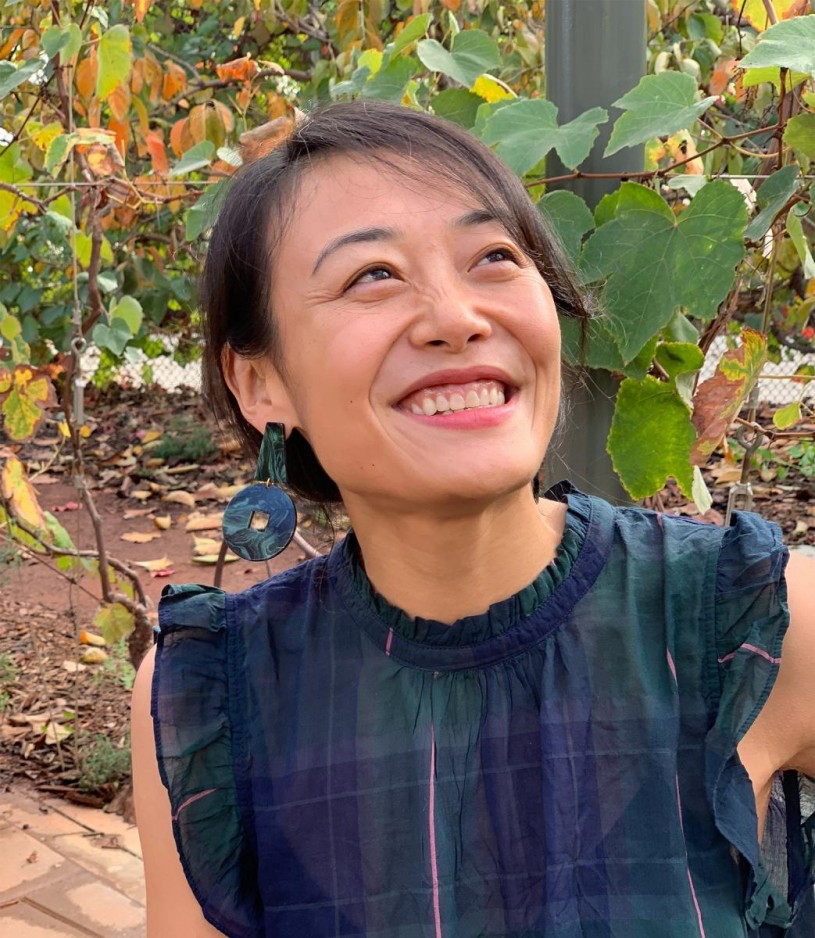
What advice would you give to people who are about to start college or graduate school?
Don’t let your dad decide your college choice?! Just kidding.
During undergraduate and graduate schools, I was so stressed out. I worried about not getting the highest scores in the class, thought my dissertation projects were not meaningful enough, got frustrated with my advisors because they hadn’t reviewed the proposal I sent to them months ago, or felt guilty for not working during the weekends. It is very common for young students to feel that they have to get everything perfectly right, otherwise their future will be in jeopardy. I know that feeling too well. I think it is really important during the school years to learn how to manage stress and to not sweat the small stuff. I am not suggesting to care less here, but simply to remind ourselves that some of those problems that seemed so big and detrimental at the moment are not actually that big of a deal in the grand scheme of things. It is silly to think my dissertation proposal approval, delayed a month, would actually ruin my life or change my career path. Learning how to relax is just as important as getting that “A” for your organic chemistry class.
How did you end up at the Natural History Museum of Los Angeles County? And please share with our readers what your role is here at NHM.
The honest answer is my boyfriend got a job at UCLA first, so I was looking for jobs in the L.A. area. I saw the job post and it was very interesting, so I applied for it. Next thing you know, I am here! On January 6, 2019, it will be my two-year work anniversary! Yay!
I am working as a GIS analyst for the Biodiversity Analysis in Los Angeles (BAILA) Initiative. BAILA is a collaboration between the Natural History Museum of Los Angeles County and The Nature Conservancy. The main duty of my position is to conduct a spatially explicit biodiversity assessment of the Greater Los Angeles Area. The goal of this assessment is to provide useful information to guide conservation practices and urban planning. Specifically, I developed an urban habitat classification to understand how the urban environment shapes and transforms the biodiversity within it.
I genuinely think this job is really cool! As the world’s urban population and urban areas continue to grow, understanding and protecting biodiversity where large numbers of people live is not only of global conservation relevance, but can also provide large numbers of people with greater chances for regular contact with, and appreciation for, biodiversity. Particularly in L.A. as it is the second largest city in the States and is in one of world’s 36 biodiversity hotspots. It is important to make L.A. enjoyable for people to live in, but also welcoming for nature and wildlife to thrive. I am glad I am part of this larger effort.
I think you are very funny and you have a great laugh. Have you always had a good sense of humor? How has having a good sense of humor helped you in school and/or at work?
At least someone thinks I am funny! My mom said I cried a lot when I was a baby. I guess I got all the cries and tears out of my system in my early childhood, and now I am left only with laughter and giggling. Growing up, I was very clumsy in sports, and too dorky and nerdy to be popular, but that never really bothered me. I never wanted to be the smartest, or prettiest person in the room, but somehow, making people laugh and smile just seemed way more significant to me! I really want to bring positive energy to people around me, and to make them feel happy and cheerful. I don’t think I am necessarily funny. I think most times I myself end up as the joke. I stumble and fall often, spilling water and wine on a daily basis, and I am very skittish and jumpy. It was so frustrating that it actually became funny!
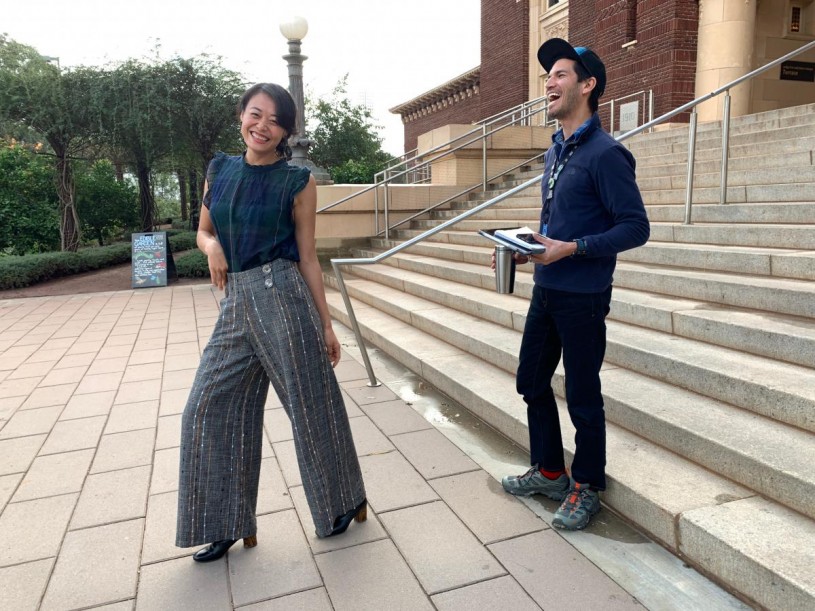
You are a woman and a person of color who has a career in science that requires you to communicate in a language that is not your first language. Do you feel you have experienced any discrimination or prejudice in a STEM field because you are a woman, a person of color, and/or a person from another country? If so, how did you manage it?
Oh boy, a touchy topic. I definitely have! When you are from a different culture, it feels like some people don’t trust that you can do the work or that you can do a good job. Some people have felt, “She cannot do it since it is not her first language," or "She cannot do it since the systems here in the States are not the ones she is coming from.” America does have a different policy system (from China), a different legal system, and a different educational system, but some people won’t even let you try. I feel really upset about that.
There are always people, doesn’t matter if you are international or American, there are always people trying to put you down. You just have to believe you can do it. At least cheer yourself up if the work is something you think you can do and something you feel excited about. I guess my advice is to not let anyone bring you down and to believe in yourself.
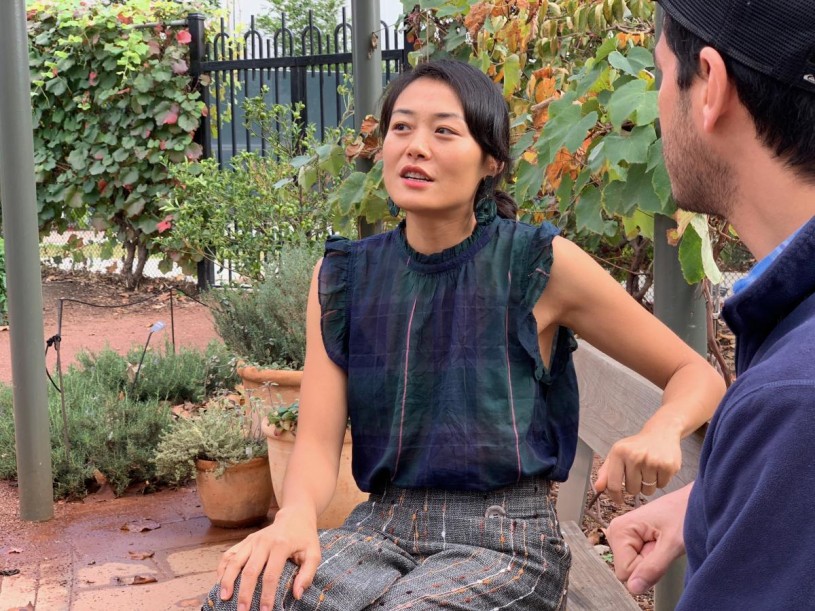
I am sorry to hear you have experienced discrimination. What do you think people in positions of power and authority could and should do to create school and work environments that are safe and allow all people to study and work with dignity?
International students coming to the States do not really know what to expect from the school system in the States. I think this is something generally felt by all students entering graduate school. We don’t know how much we can ask from our advisors, what is considered a reasonable request, or if are we allowed to talk to the dean or department head. I think it would be great if schools would discuss with students about what they can expect from their department, advisor, and even the university. Helping students understand how to navigate the system better is something I think the whole graduate school system could do. That would be great.
Lastly, what are some of your favorite places to visit in Los Angeles (to eat, socialize with friends, experience culture, be by yourself, etc.)?
Oh boy! I love food, music, stand-up comedians, museums, independent and foreign movies, and nature, so I LOVE L.A.!
I really appreciate the diversity of people, culture, food, art, and nature here. I am a newcomer to L.A. so I am always in the process of finding my next favorite places. In general, as a Chinese person who grew up in the Korean Autonomous Region of China, I love going to San Gabriel, Monterey Park, and the Koreatown areas for dining. In those areas, you can always find some really authentic Chinese and Korean food. What is cool about those neighborhoods is not that they sell and serve good ethnic foods, but that these are communities who have kept their original cultures and customs.
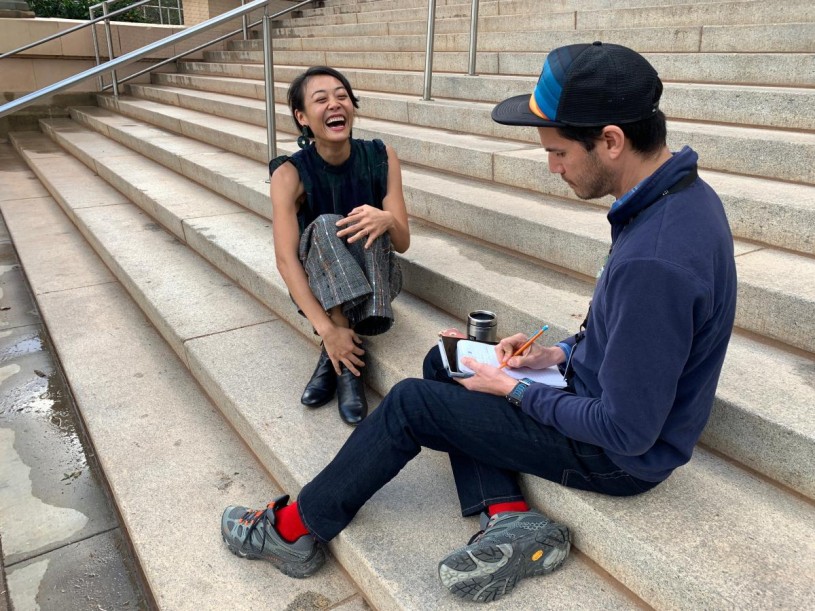
Thank you for your time, Jane. It was a pleasure getting to know you through this interview.
Thank you, Richard! Next time I want to interview you!
Interview conducted by email and in person, and then condensed and edited. All photos by Maiz Connolly.